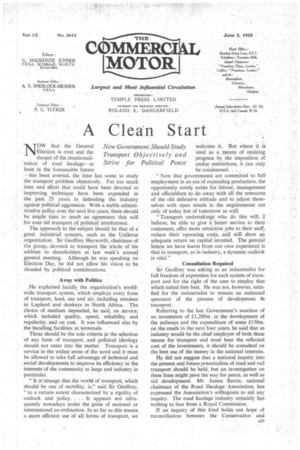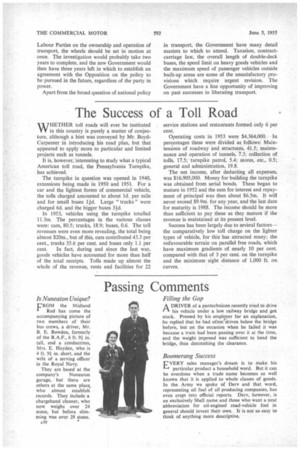A Clean Start
Page 31

Page 32

If you've noticed an error in this article please click here to report it so we can fix it.
NOW that the Genera] Election is over and the danger of the renationalization of road haulage—at least in the foreseeable future —has been averted, the time has come to study the transport problem objectively. Far too much time and effort that could have been devoted to improving technique have been expended in the past 25 years in defending the industry against political aggression. With a stable administrative policy over the next five years, there should be ample time to reach an agreement that will for ever rid transport of political interference. . The 'approach to the subject should be that of a great industrial concern, such as the Unilever organization. Sir Geoffrey Heyworth, chairman of the group, devoted to. transport the whole of his 'address to shareholders at list week's annual general meeting. Although he was speaking on Election Day, he did not allow his vision to be clouded by political considerations.
Away with Politics He explained lucidly the organization's worldwide transport system, which employs every form of transport, land, sea and air, including reindeer in Lapland and donkeys in North Africa. The choice of medium depended, he said, on service; which included quality, speed, reliability and regularity, and on cost. It was influenced also by the handling facilities at terminals.
Those should be the sole criteria in the selection of any form of transport, and political ideology should not enter into the matter. Transport is d service in the widest sense of the word and it must be allowed to take full advantage of technical and social developments to improve its efficiency in the interests of the community at large and industry in particular. • "It is strange that the world of transport, which should be one of mobility, is," said Sir Geoffrey, " to a certain extent characterized by a rigidity of outlook and policy. . . It appears not infrequently nowadays under the guise of national or international co-ordination. In so far as this means a more efficient use of all forms of transport, we welcome it. But where it is used as a means of resisting progress by the imposition of undue restrictions, it can only be condemned. .
"Now that governments are committed to full employment in an era of expanding production, the opportunity surely exists for labour, management and officialdom to do away with all the remnants of the old defensive attitude and to adjust themselves with open minds to the requirements not only of today but of tomorrow as well.
"Transport undertakings who do this will. I believe, be able to give I better service to their customers, offer more attractive jobs to their staff, reduce their operating costs, and still show an a,dequate return on capital invested. The general lesson we have learnt from our own experience is that in transport, as in industry, a dynamic outlook is vital."
Consultation Required Sir Geoffrey was asking as an industrialist for full freedom of expression for each system of transport and for the right of the user to employ that which Suited him best. He was not, however, satisfied for the industrialist to remain an animated spectator of the process of development in transport.
Referring to the last Government's sanction of an investment of £1,200m. in the development of the railways and the expenditure of some £15Orn. on the roads in the next four years, he said that as industry would be the chief employer of both these means for transport and must bear the reflected cost of the investments, it should be consulted on the best use of the money in the national interests.
He did not suggest that a national inquiry into the present and future potentialites of road and rail transport should be held, but an investigation on these lines might pave the way for peace, as well as • aid development. Mr. James Barrie, national chairman of the Road Haulage Association, has expressed the Association's willingness to aid any inquiry. The road haulage industry certainly has nothing to fear from a Royal Commission. If an inquiry of this kind holds out hope of reconciliation between the Conservative and A29 Labour Parties on the ownership and operation of transport, the wheels should be set in motion at once. The investigation would probably take two years to complete, and the new Government would then have three years left in which to establish an agreement with the Opposition on the policy to be pursued in the future, regardless of the party in power.
Apart from the broad question of national policy in transport, the Government have many detail matters to which to attend. Taxation, contractcarriage law, the overall length of double-deck buses, the speed limit on heavy goods vehicles and the maximum speed of passenger vehicles outside built-up areas are some of the unsatisfactory provisions which require urgent revision. The Government have a fine opportunity of improving on past successes in liberating transport.




































































































